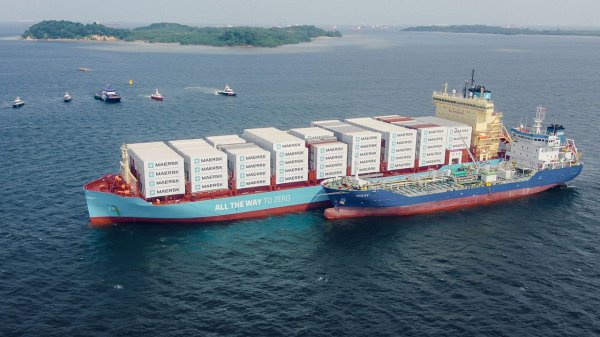MGO plummets $70 in Brazil following pricing committee meeting
Decision to slash marine distillate prices by over 10% follows 10.4% reduction in the price of diesel.
Petroleo Brasileiro (Petrobras) S.A. slashed the price of marine gas oil (MGO) across all Brazilian ports on Thursday - less than 24 hours after the company's Markets and Pricing Executive Committee decided to cut the price of diesel and gasoline sold at its refineries.
The Brazilian energy firm reduced the price of diesel - a middle distillate - by 10.4 percent on Wednesday, whilst gasoline prices were cut by 3.1 percent.
On Thursday, the company's bunker division kept the price of intermediate fuel oil (IFO) unchanged in all Brazilian ports, whilst marine distillate prices were slashed by $70 - at a similar percentage rate to diesel.
At the port of Santos, the price of MGO fell $70, or 10.3 percent, to $670.50 per tonne. In Rio de Janeiro, MGO dropped $70, or 10.5 percent, to $594.50 per tonne.
"The combination of a 12.1% fall in the international prices of oil and oil products between October 14 and today and the reduction in the company's domestic market share has impacted the usage level of Petrobras' assets, especially its refineries, its inventory levels and also its flows of imports and exports. These variables justified a greater correction in the diesel price than in the gasoline price," Petrobras said in an announcement on Wednesday.
Petrobras added: "The methodology defined by Petrobras provides for adjustments to the prices charged at its refineries at least once a month, following analysis by the committee, made up of the company's CEO, refining and natural gas director, and finance and investor relations director.
"The aim is to enable Petrobras to implement a competitive pricing policy that reflects movements in the international oil market in shorter periods."
The Brazilian energy firm reduced the price of diesel - a middle distillate - by 10.4 percent on Wednesday, whilst gasoline prices were cut by 3.1 percent.
On Thursday, the company's bunker division kept the price of intermediate fuel oil (IFO) unchanged in all Brazilian ports, whilst marine distillate prices were slashed by $70 - at a similar percentage rate to diesel.
At the port of Santos, the price of MGO fell $70, or 10.3 percent, to $670.50 per tonne. In Rio de Janeiro, MGO dropped $70, or 10.5 percent, to $594.50 per tonne.
"The combination of a 12.1% fall in the international prices of oil and oil products between October 14 and today and the reduction in the company's domestic market share has impacted the usage level of Petrobras' assets, especially its refineries, its inventory levels and also its flows of imports and exports. These variables justified a greater correction in the diesel price than in the gasoline price," Petrobras said in an announcement on Wednesday.
Petrobras added: "The methodology defined by Petrobras provides for adjustments to the prices charged at its refineries at least once a month, following analysis by the committee, made up of the company's CEO, refining and natural gas director, and finance and investor relations director.
"The aim is to enable Petrobras to implement a competitive pricing policy that reflects movements in the international oil market in shorter periods."

|
VARO Energy expands renewable portfolio with Preem acquisition
All-cash transaction expected to complete in the latter half of 2025. |
|
|
|
||

|
NYK trials biofuel in milestone coal carrier test
Vessel is used to test biofuel for domestic utility company. |
|
|
|
||

|
H-Line Shipping orders LNG bunkering vessel
Vessel with 18,000-cbm capacity to run on both LNG and MDO. |
|
|
|
||

|
How to engineer and manage green shipping fuels | Stanley George, VPS
Effective management strategies and insights for evolving fuel use. |
|
|
|
||

|
Swedish government bans scrubber wastewater discharges
Discharges from open-loop scrubbers to be prohibited in Swedish waters from July 2025. |
|
|
|
||

|
MAN Energy Solutions achieves 100% load milestone for ammonia engine
Latest tests validate fuel injection system throughout the entire load curve. |
|
|
|
||

|
Petrobras secures ISCC EU RED certification for B24 biofuel blend at Rio Grande
Blend consisting of 24% FAME is said to have been rigorously tested to meet international standards. |
|
|
|
||

|
Stolt-Nielsen to fully control Avenir LNG with acquisition
Share purchase agreement to buy all shares from Golar LNG and Aequitas. |
|
|
|
||

|
Bureau Veritas supports launch of CIMC SOE's LNG bunkering vessel
Handover of Seaspan Energy's cutting-edge 7,600-cbm vessel completed. |
|
|
|
||

|
Methanol as a marine fuel | Steve Bee, VPS
How environmental legislation has driven the development of low-sulphur fuels and methanol-ready ships. |
|
|
|
||
Related Links
- · Trader cover at Petrobras [Insights]
- · Petrobras starts selling RMK 500 in Santos [Insights]
- · Agreement to sell Petrobras Chile is signed [Insights]
- · Bahia Blanca refinery sold in Petrobras Argentina divestment [Insights]
- · Petrobras adds bunker barge in Rio de Janeiro [Insights]
-
· Petroleo Brasileiro (Petrobras) S.A. [Directory]
- · Brazil [Directory]
- · Rio de Janeiro [Directory]

